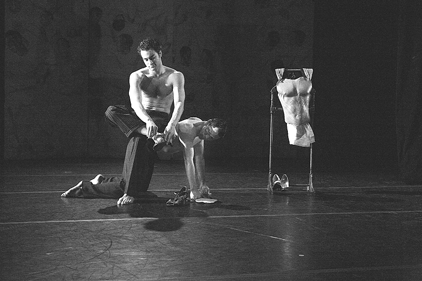Blondie, Baryshnikov, and a dancing hero
By GUS SOLOMONS Jr.
Six-foot-five Richard Move, who channels Martha Graham with eerie insight, created, directed, and choreographed “The Show (Achilles Heels)” in 2002 originally for Baryshnikov’s White Oak Project with Misha in the title role. From April 27-May 6, the Baryshnikov Dance Foundation and Move’s organization MoveOpolis have revived and recast the hour long epic at the Kitchen with dancing phenomenon Rasta Thomas as Achilles and rock goddess Deborah Harry (Blondie) as Athena, goddess of wisdom, doubling as game show host.
Like Graham, Move dares to tackle epic themes but treats them with a thoroughly up-to-date sensibility. The scale of production does nothing to dampen the emotional sweep of his vision. Move is equally at home on a six-by-eight foot cabaret stage or an opera house. In fact, the artistically evolving Graham troupe should seriously consider commissioning a ballet from him.
At the modest black-box Kitchen, two reversible four-panel screens by Nicole Eisenman, painted with cartoon-like people, serve as a simple, symmetrical backdrop for the lively action. Ensemble passages for three women and three men fill the space with swirling, angular motion, fraught with heroic passion.
Move’s fascination with Achilles’ “unusual” personal life and his military derring-do form the basis for his narrative. Achilles cross-dresses in high heels and a gold bustier in a duet with his military aide and off-duty boyfriend, Patroclus, danced by sultry Miguel Anaya, revealing his sexual ambiguity. A turn as a star contestant on a TV reality game show—the Jeopardy-style “It’s Greek to Me,” hosted by Athena—depicts his military expertise. Later, as a video game super hero, he shows off his combat skills, karate kicking his way through his last fatal battle.
Dialog, recorded and lip-synched by the dancers, smartly avoids the near-inevitable pitfalls of trying to get dancers to act, while enhancing their characterizations and letting them dance fully. Catherine Cabeen, Blakeley White-McGuire, and Heather Waldon switch from nymphs to warriors, depending on whose voices emanate from their synchronized lips. Corbin Popp and Kevin Scarpin maneuver their well-toned bodies as hunky warriors. Achilles’s recoded voice is that of Baryshnikov, who’s equally at home acting or dancing.
One can hardly imagine even Baryshnikov in his prime dancing the role of Achilles with more emotional and physical force than Rasta Thomas, seen recently on Broadway in Twyla Tharp’s “Movin’ Out.” Thomas lives up to his sobriquet as “a force of nature.” His kinetic and dramatic authority in gestural solos—sprinkled liberally with pyrotechnic leaps, breath-stopping balances, and power-drill spins—is astonishing. And he astutely underplays the boy-boy tango/polka with Patroclus, making it poignantly convincing.
Graham Company soloist Katherine Crockett, startlingly tall, willowy, and blond is a ravishing Helen of Troy in several melancholy solos that show off her gorgeous leggy-ness and lyrical angularity. Much of her movement comes straight from the Graham lexicon: knee vibrations with one leg describing figure eights around the other; pitch turns with a leg extended high to the rear, torso careening forward; and back hinging falls, but in this context the steps gain refreshing buoyancy.
Deborah Harry, whose songs spice the narrative, looks fabulous in a different chic outfit each time she enters. She’s a confident, reassuring Chorus, guiding us along, emceeing the TV show, and singing the sweetly ironic songs by her, Romy Ashby, and others, that accompany the action, along with original music by Arto Lindsay. Pilar Limosner’s sheer black, corseted costumes are elegantly sleek, and Les Dickert’s dramatic lighting creates spatial depth and mystery.
gaycitynews.com

































